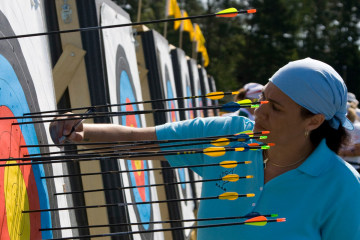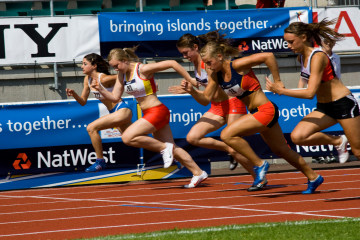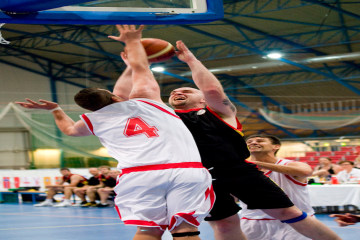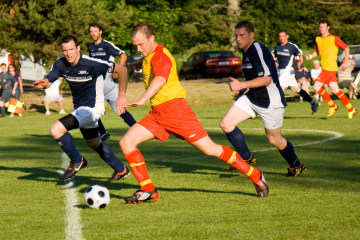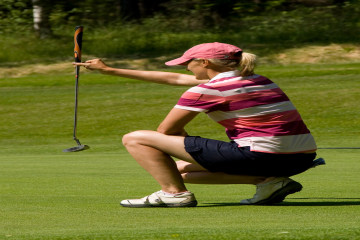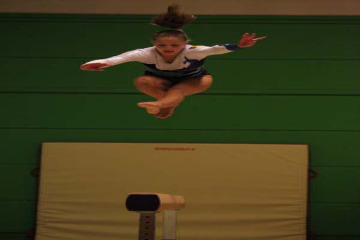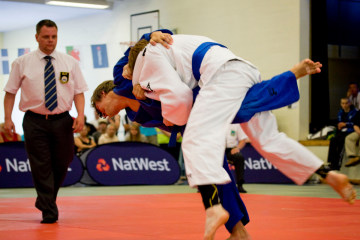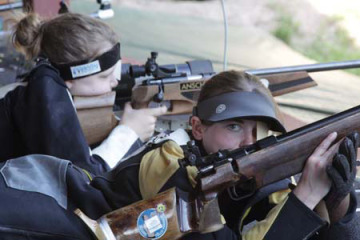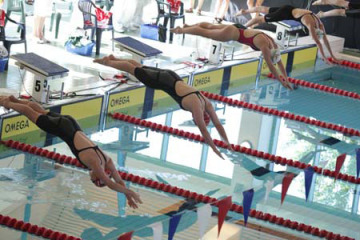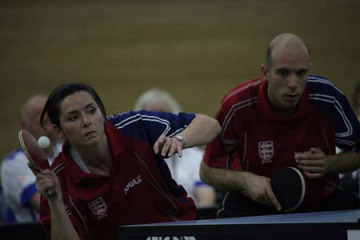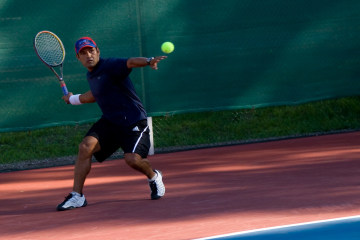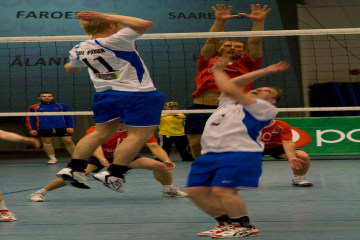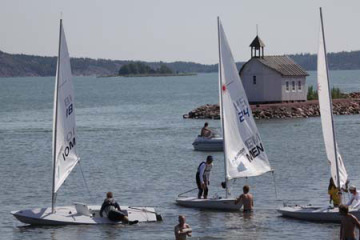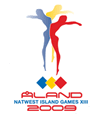
NatWest Island Games XIII - Aland 2009
27th June - 4th July 2009
NatWest Island Games returns to Aland
The NatWest Island Games returned to the Finnish self-governing province of Aland in the summer of 2009 after a gap of 18 years with around 2900 competitors and officials and hundreds of spectators converging on the capital Mariehamn where the event was based. A total of 25 islands took part in 14 sports.
Athletes and spectators swelled Aland’s population between the end of June and early July by an estimated 12 % and made the 13th NatWest Island Games the largest sporting occasion witnessed by local residents. Said Dick Ekstrom, chairman of the Organising Committee: ‘I am proud of the way in which the people of the Aland Islands contributed to the success of the Games.
‘This achievement would not have been possible without the help from everyone including the volunteers, the organisers of the various sports, our government and the population of Aland who offered a warm welcome to guests from all over the world. We needed every hand on deck to sail the ship and the crew said yes.’
The analogy with the sea was appropriate given that this is what binds all the competing nations together – as well as keeping them apart. The water ceremony, the now traditional curtain-raiser to the Games, had its origins in Aland in 1991 and has featured in every event since then.
This concept was taken a stage further by the 2009 organising committee which came up with the idea of having the gold, silver and bronze medals designed in the form of water drops. Games Director Terese Flojt explained: ‘Very early in the process we decided the theme should be water as this is the common denominator for all the participating islands and has a large symbolic value.’
The NatWest Island Games of 2009 reached a significant milestone. The Membership of the International Island Games Association, having previously agreed to adopt the principles of the World Anti-Doping Code and consequently agreed to adopt the IIGA Anti-Doping Rules, drug testing in more than one sport was to be carried out for the first time.
At the request of the Executive Committee all 25 member Island Associations appointed Education Officers to instigate anti-doping education programmes for their athletes. There were also warnings that, while competitors should refrain from using performance-enhancing or recreational drugs, they should also be careful they did not take, inadvertently, banned substances which were contained in medical remedies. It was made clear that some items such as vitamin pills or energy supplements could contain trace ingredients of the list of banned substances not itemised on the container.
The drug testing was carried out by officials from the Doping Control Laboratory at Karolinska University Hospital in the Swedish capital Stockholm and at the conclusion of the Games the IIGA said it was pleased to announce the event had been ‘clean’ with no positive tests recorded.
Aland embraced the 2009 Games in a big way. As the competitors, officials and spectators arrived they were greeted by the sight of the national flags of all the countries flying proudly on Games Street, while flowers decorating Mariehamn had been prepared in colours symbolising the occasion. Large welcome banners were sited at every entrance to the capital, not to mention depictions of Selina the Seal – the official mascot.
One of the many tasks facing the organising committee was putting together the 3,000 plus gift bags which were distributed on arrival. All the items for inclusion were delivered to the local indoor ice rink where a stream of volunteers created their own convenor belt operation to get the job done.
None of the competitors were more deserving of the gifts than the contingent from St.Helena. Although the Games didn’t begin until June 27th the team from the remote Island in the South Atlantic had to begin its journey eleven days earlier.
It started with a 700 miles, three day, sea journey to Ascension Island where the group stayed with family or friends until June 23rd when they were flown to Brize Norton in the UK and thence by coach to Heathrow. From Heathrow it was on to Sweden and finally by ferry to Aland. The journey, in reverse, followed at the conclusion of the Games and, in all, the squad had been away from St. Helena for a month!
The number of competitors per Island ranged from three from Sark, 198 from Jersey and 224 from the Host Island Aland whilst the Isle of Man brought 174. Each Islands General and Sports Team Officials swelled these numbers even further.
Competition got underway following a two-hour opening ceremony during which the Games were officially declared open by Roger Nordlund, Speaker of the Aland Parliament. Gibraltar claimed the honour of taking the first Gold medals on offer when Heloise Manasco and Stephanie Piri won the team event in the women’s air rifle competition.
Heloise was later to pick up a second Gold in the air rifle individual and on hand to present her with the medal was Gibraltar’s Sports Minister Edwin Reyes, a keen spectator and team supporter. Meanwhile, there was more glory for the Piri family when Stephanie’s father Wayne also claimed a rifle shooting Gold and in recognition the pair was selected to carry the national flag during the closing ceremony.
By the time this came round a total of 604 medals had been presented; 56 records were broken and 20 out of the 25 member Islands went home with at least one medal. The official results website was in great demand and during the week of the Games recorded almost 1.2 million page views – together with many more in the following months.
The final medal table showed the Faroe Islands to be the strongest overall, amassing a total of 34 Gold, 23 Silver and 24 Bronze medals. Next came the Isle of Man with a tally of 29-30-29 while Jersey was third with figures of 24-37-19. Guernsey, Gotland, Aland, Bermuda, Menorca, the Cayman Islands and Saaremaa completing the top ten.
There were some exceptional individual performances such as that of Jersey’s Ian Black who won eight medals including four Golds and two Games records to his credit while gymnast Alex Hedges won six Golds and one Silver – on the same day – for the Isle of Man. His team-mate, swimmer Grant Halsall, was also a triple Gold medallist and established a new Great Britain junior record in the men’s 50 metres backstroke.
One of the youngest competitors in the athletics also proved herself one of the best. Shetland’s Emma Leask, at just 15, won the 800 metres in one of the competition’s closest finishes and just an hour later anchored the Shetland team to a Bronze in the women’s 4x400 metres relay.
There was a close finish of a different kind in the men’s golf competition which, incidentally, made its debut in the Games the last time the event was held in Aland in 1991. Bermuda’s Jarryd Dillas won the individual gold medal after a three-hole sudden death play-off with David Jones from the Isle of Man after they had finished level after 72 holes. There was also a play off between Bermudan and Manx golfers for the bronze medal.
In contrast, Aland’s Jenny Haggblom had five shots in hand at the finish of the women’s event. She held a massive lead of 13 shots going into the last round on her home course but there were a few heart-stopping moments to come. Haggblom started the round with two double bogeys and finished up eight over par. However, she said afterwards: ‘I didn’t get nervous despite the bad start because I knew I had a big lead.’
Eduardo Torres, the number one seed, proved himself the best men’s tennis player when he retained the singles title for the Cayman Islands with a victory in the final over the host nation’s Peter Forsstrom. Torres thus added another Gold medal to the one he won in Rhodes two years earlier.
The men’s football competition is always fiercely contested and this one was no exception with Jersey defeating Channel Islands rivals Guernsey in the semi-final and then triumphing 2-1 in the final over Aland. It was a good warm-up for Jersey as they had a friendly match lined up with English Championship outfit Scunthorpe shortly after their return home.
Football provided one of the more unusual stories of the Games when Aland’s women footballers rattled in 20 goals against Saaremaa –the scoreboard running out of numbers as it only went up to 19. However, Saaremaa’s basketball team took revenge on Aland when they met in the men’s competition and came out the winners to the tune of 120-26.
Athletics saw some well known international performers representing their islands. Guernsey’s Dale Garland flew in by private jet to take part in the latter stages and helped them to a gold medal in the 4x400 metres relay – as well as a qualifying time for the 2010 Commonwealth Games. Former European marathon champion Janne Holmén pulled on the vest of his native Aland and lapped all his rivals in the 10,000 metres – some of them twice. There was a standing ovation for Holmén, as there was for 62 year old Shetlander Bill Adams who finished 13th.
Meanwhile, as Messrs Holmén, Garland and all the others were having stories written about them in their own Island newspapers a former Games cycling gold medallist was making headlines of a different kind. As the Aland gathering drew to a close there came news that the Isle of Man’s Mark Cavendish – now one of the world’s leading riders – had won an early stage of the Tour de France. By the end of the Tour in Paris Mark had added another five stage victories.
The 13th NatWest Island Games was undoubtedly a major success, not least because of the glorious weather. But, as Jorgen Pettersson, chairman of the International Island Games Association, told me, sunshine and heat in isolation was never going to be enough.
Said Jorgen: ‘Without a good organisation and plenty of volunteers sunshine does not matter. Aland put everything in place and had their priorities right. The inhabitants have never before come together in such a big way and afterwards they were all enthusiastic about the Games and playing hosts to visitors from all over the world.’
Leader of the Town Council in Mariehamn, Gunnar Jansson, spoke of their pride at staging the event for a second time and promised that one day they would again play hosts. He was speaking at the official opening of a commemorative fountain which will serve as a permanent reminder of the 13th Games.
The ceremony began with local pop star Mikaela Mattsson singing the official anthem and ended with former sprinter Tove Jansson pouring water from each of the 25 member Islands into the fountain. Also present was Aland Sports Minister Britt Lundberg who said the Games were the pinnacle of the athletic career for most participants.
So, as the curtain came down on Aland 2009 I leave the last word to journalist Gareth Le Prevost, a veteran of four such meetings. He wrote in his paper, the Guernsey Press: ‘The NatWest Island Games are always something special and the four in which I have been involved as a reporter hold many happy memories.
‘However, the Games on the Swedish-speaking, yet Finnish Island, were the best I have been to, without a doubt.’
Colin Brown
Colin Brown Press and PR Services
Sports Held
Below is a list of sports held at these games. Once results are available they will be linked below.
Members Attending
For a profile about a member simply click their name below.
Photos
To view a larger version of one of the following photos simply click the thumbnail.



